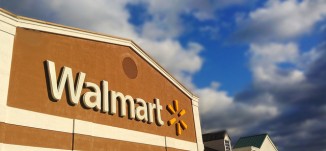Thousands of synthetic chemicals are used to create toys, clothes, makeup, cleaning products, and all of the other items we use everyday. Some are harmless, but others can upset our health and damage the environment in which we live.
In recent years, more and more regulations have either blocked or eliminated the use of these substances. More encouraging, corporations are deciding to limit their use.
 NEED MORE GOOD NEWS? …GET OUR NEW APP—> Download FREE for Android and iOS
NEED MORE GOOD NEWS? …GET OUR NEW APP—> Download FREE for Android and iOS
In his book Chemicals Without Harm, Ken Geiser explores the idea of developing and adopting safer alternatives to hazardous chemicals rather than focusing exclusively on controlling them.
The condensed excerpt below highlights some of the biggest companies we purchase from today and how they are evolving to become more natural.
As consumers increasingly seek more sustainable products, retailers — especially large retailers — have become a new voice for the chemical safety of the products they sell.
In the absence of stronger federal regulations, retailers have strengthened their own chemical policies, which also include requirements for their suppliers and a list of chemicals that should be avoided. For some time, specialized retailers such as Patagonia, REI, H&M, and the Body Shop have had product supplier programs that screen out hazardous chemicals from their products.
MORE: De-icing Concrete Can Make Bridges Safer, Airports More Reliable
In 1996, Patagonia’s founder, Yvon Chouinard, switched the majority of the apparel line to organic cotton as a means of raising customer awareness. Although Patagonia’s organic cotton t-shirts, “Beneficial Ts,” became a national market leader, Chouinard recognized the limits of a small retailer in shaping the market and turned his attention to the broader apparel market.
Working together, Patagonia and several similar retailers engaged the Switzerland-based “bluesign technologies” to develop a product standard for apparel. With the motto “If you don’t know, you don’t care,” bluesign built a standard around five values: consumer safety, resource consumption, water quality, air quality, and occupational health and safety. To be certified by bluesign, a supplier of dyes, coatings, finishing agents, and other textile constituents must submit to an on-site facility audit and prepare a chemical screening using special software that converts a list of chemical ingredients into a color-coded score indicating whether a substance can be used without restriction or only under specific conditions. H&M, a larger clothing retailer with operations in 22 countries, has created its own chemical management screening process.
On the other end of the retail market, the huge purchasing contracts of “big box” retailers such as Walmart, Target, Home Depot, and Staples have produced immeasurable good after these stores set higher standards.
Two of the three largest office products retailers, Staples and Office Depot, representing nearly 50 percent of the sector’s sales, now impose environmental requirements on their suppliers, if they are to be marketed as environmentally preferable, including bans on endocrine disruptors and volatile organic compounds.
“Being a market leader is a big responsibility. We are not just improving the environmental profile of our suppliers we are making customers aware of how their purchases have real consequences on the health and safety of the offices that they work in and the places they go home to.”
MORE: Congress Takes Quick Action to Keep Plastic Microbeads Out of U.S. Water
In terms of scale, Walmart is the world’s heavyweight retailer. With 7,000 retail stores in 15 countries, this one retailer has an unparalleled capacity to shape commercial markets, and, since 2005, its sustainability program set targeted goals to reach 100 percent renewable energy, achieve zero waste, and “sell products that sustain our resources and environment.” In 2004, Walmart began tracking hazardous chemicals in its stores to ensure regulatory compliance.
 New policies were established for Walmart buyers focused on preferential purchasing of garments made with organically grown cotton, toys that did not contain lead or phthalates, and electronic products compliant with the European RoHS Directive. To gain advice from outsiders, the retailer set up a series of fourteen advisory groups called Sustainable Value Networks that focused on various environmental impacts ranging from energy efficiency, waste reduction, and packaging reduction to “chemical-intensive products.” This last group identified twenty chemicals of high concern and recommended restricting their presence in products, leading the retailer to ban certain pesticide and cleaning products. In 2008, Walmart changed course by moving away from a discrete list of restricted substances to a third-party-based screening process.
New policies were established for Walmart buyers focused on preferential purchasing of garments made with organically grown cotton, toys that did not contain lead or phthalates, and electronic products compliant with the European RoHS Directive. To gain advice from outsiders, the retailer set up a series of fourteen advisory groups called Sustainable Value Networks that focused on various environmental impacts ranging from energy efficiency, waste reduction, and packaging reduction to “chemical-intensive products.” This last group identified twenty chemicals of high concern and recommended restricting their presence in products, leading the retailer to ban certain pesticide and cleaning products. In 2008, Walmart changed course by moving away from a discrete list of restricted substances to a third-party-based screening process.
None of these retailers has a perfect record on all features of sustainability. Many have been criticized for problems in their foreign supply chains, and some have been criticized for their domestic labor relations.
Such criticisms may be warranted; however, they do not negate the progress that these firms have driven in terms of chemical hazards. These retailers are broadening the definition of a quality product by making consumers more aware of the health and environmental values of products, particularly chemical hazards, while sending assertive messages up the supply chain.
Conventionally, retailers have been seen as simply promoters of products, but today retailers are defining a new role as agents for consumers–and, even more, as educators and partners of consumers. Such a reorientation creates a new voice for safer chemicals and provides important leverage for changing the chemical economy.
 LOOK: Ontario is First Region in North America to Curb Pesticide Blamed for Killing Bees
LOOK: Ontario is First Region in North America to Curb Pesticide Blamed for Killing Bees
The Environmental Defense Fund’s Richard Dennison hails this new corporate role as “regulation by retailer” and quips, “Chemical manufacturers need to be reminded that good business practice involves delivering what the customer wants — and product retailers know that voice best.”
Ken Geiser is Professor Emeritus of Work Environment at the University of Massachusetts Lowell, Founder and past Codirector of the Lowell Center for Sustainable Production. He is also one of the authors of the Massachusetts Toxics Use Reduction Act, and was Director of the Massachusetts Toxics Use Reduction Institute for thirteen years.
(Excerpt Reprinted With Permission–Photo by Ani-Bee, CC)




















